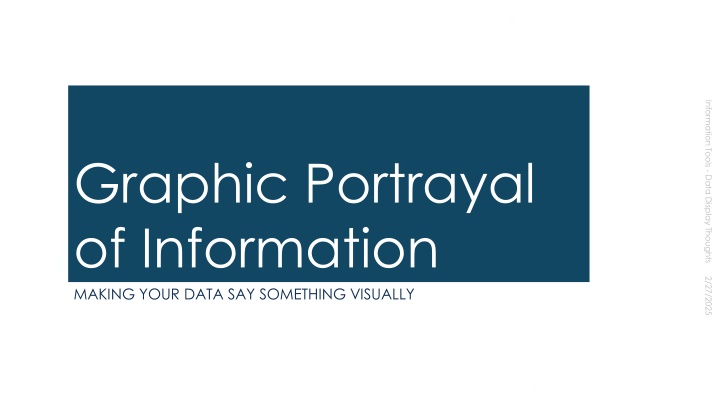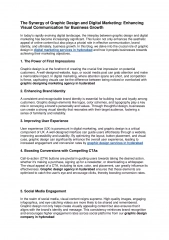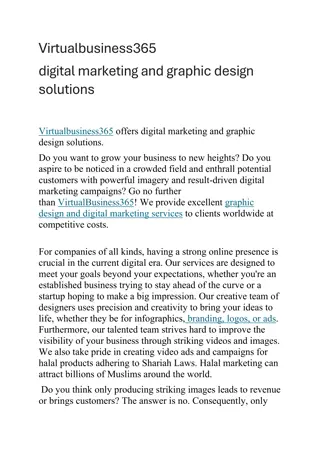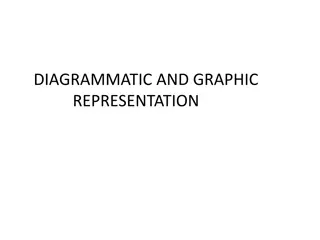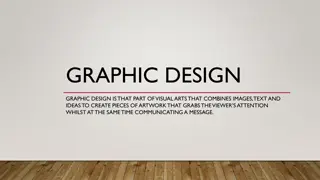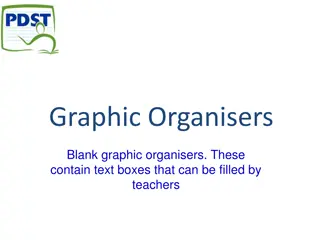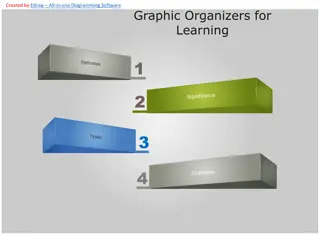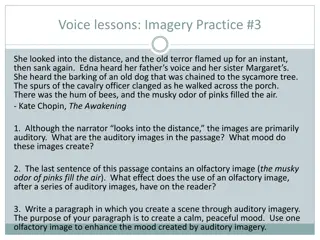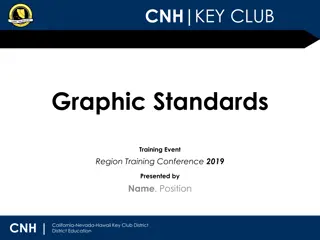Graphic Portrayal of Information: Making Your Data Speak
Effective data visualization is crucial for conveying insights clearly. Learn from pioneers like William Playfair, Jacques Bertin, and Edward Tufte who revolutionized the field. Understand the significance of graphical displays in communicating ideas with precision and avoiding distortion. Dive into the world of retinal variables and visual elements to enhance the impact of your data representations.
Download Presentation

Please find below an Image/Link to download the presentation.
The content on the website is provided AS IS for your information and personal use only. It may not be sold, licensed, or shared on other websites without obtaining consent from the author.If you encounter any issues during the download, it is possible that the publisher has removed the file from their server.
You are allowed to download the files provided on this website for personal or commercial use, subject to the condition that they are used lawfully. All files are the property of their respective owners.
The content on the website is provided AS IS for your information and personal use only. It may not be sold, licensed, or shared on other websites without obtaining consent from the author.
E N D
Presentation Transcript
Graphic Portrayal of Information MAKING YOUR DATA SAY SOMETHING VISUALLY
The purpose of visualization, is insight, not pictures. Ben Shneiderman, founding director of the Human-Computer Interaction Laboratory at the University of Maryland MAKING YOUR DATA SAY SOMETHING VISUALLY
It matters because Like good writing GRAPHICAL DISPLAYS OF DATA COMMUNICATE IDEAS with clarity precision efficiency
It matters because Like poor writing, BAD GRAPHICAL DISPLAYS distort or obscure the data make it harder to understand or compare or otherwise thwart the communicative effect which the graph should convey
Three big names William Playfair The Commercial and Political Atlas (1786) Jacques Bertin The Semiology of Graphics (1967/1983) Book Cover Edward Tufte The Visual Display of Quantitative Information (1983)
William Playfairs Contributions Playfair first published The Commercial and Political Atlas in 1786, in London. It contained 43 time series plots and one bar chart, a form apparently introduced in this work. It has been described as the first major work to contain statistical graphs.
Jacques Bertins Contributions Jacques Bertin sSemiology of Graphics (1967/1983) systematically classified the use of visual elements to display data and relationships in 1997 Jacques Bertin Bertin's system consists of seven visual variables: position, shape , color hue, orientation, texture, size, and value, combined with a visual semantics for linking data attributes to visual elements.
Bertins Retinal Variables so called because the retina of the eye is sensitive to them, independent of the location of the object
Edward Tufte Book Cover
Graphical Excellence that which gives the viewer the greatest number of ideas in the shortest time with the least ink in the smallest space Book Cover
Graphical Excellence that which gives the viewer the greatest number of ideas in the shortest time with the least ink in the smallest space Minard smap of Napoleon s march to and from Moscow Book Cover
Graphical Integrity representation of numbers should be directly proportional to the numerical quantities represented
Graphical Integrity representation of numbers should be directly proportional to the numerical quantities represented graphics must not quote
Graphical Integrity representation of numbers should be directly proportional to the numerical quantities represented graphics must not quote out of context clear, detailed, and thorough labeling should be used to defeat graphical distortion and ambiguity
Graphical Integrity representation of numbers should be directly proportional to the numerical quantities represented graphics must not quote out of context clear, detailed, and thorough labeling should be used to defeat graphical distortion and ambiguity show data variation, not design variation
Graphical Integrity representation of numbers should be directly proportional to the numerical quantities represented graphics must not quote out of context clear, detailed, and thorough labeling should be used to defeat graphical distortion and ambiguity show data variation, not design variation
Graphical Integrity representation of numbers should be directly proportional to the numerical quantities represented graphics must not quote out of context 100 clear, detailed, and thorough labeling should be used to defeat graphical distortion and ambiguity 80 90 show data variation, not design variation 70 60 50 40 30 20 10 0 1979 84 89 94 99 2004
Graphical Integrity representation of numbers should be directly proportional to the numerical quantities represented graphics must not quote out of context clear, detailed, and thorough labeling should be used to defeat graphical distortion and ambiguity show data variation, not design variation
Graphical Integrity representation of numbers should be directly proportional to the numerical quantities represented graphics must not quote out of context clear, detailed, and thorough labeling should be used to defeat graphical distortion and ambiguity show data variation, not design variation
Graphical Integrity graphics must not quote out of context clear, detailed, and thorough labeling should be used to defeat graphical distortion and ambiguity show data variation, not design variation New York Times 19 Dec 1978
Graphical Integrity clear, detailed, and thorough labeling should be used to defeat graphical distortion and ambiguity Washington Post
Graphical Integrity clear, detailed, and thorough labeling should be used to defeat graphical distortion and ambiguity Hannah Fairfield, former editor for The New York Times, and now graphics director for The Washington Post, had a look at gas prices versus miles driven per capita. The chart could ve easily been an x-y scatterplot, but the extra step was taken to connect the dots so to speak. Points were ordered by time, and turns were clearly explained graphically. Miles driven per capita is on the horizontal, and the adjusted price of gasoline is on the vertical. The drawn path indicates order in time. Americans have driven more miles every year than the year before, almost every year, but there s been a swing as of late. High unemployment has meant less people driving to work, and less consumer spending means less freight moving across the country. As a result, the path appears to swing in the opposite direction. New York Times 02 May 2010
Graphical Integrity clear, detailed, and thorough labeling should be used to defeat graphical distortion and ambiguity New York Times 16 March 2018
From all over North Carolina Home Towns of NC Residents 12 Charlotte 10 Greensboro Chapel Hill 8 Camden Catawba Clemmons Cornelius Council Denver Cary 6 Raleigh Elizabeth City Elizabethtown Fuquay Varina Hope Mills Hubert Jacksonville Kinston Durham Hickory New Bern Oak Ridge Pittsboro Reidsville Rocky Mount Saint James Salisbury 4 Taylorsville Thurmond Wake Forest Waynesville Whiteville Wilmington Sanford Apex Carrboro Lenoir Matthews Knightdale Marion Mars Hill Waxhaw Weddington 2 Clinton Fayetteville High Point Wilson Asheboro Winston-Salem Ash Asheville Biltmore Lake Gastonia Graham Henderson Moyock Summerfield Mebane Indian Trail Hillsborough Morrisville Statesville 0 La GrangeLaurinburg Morehead City Burlington Spencer Highlands BSIS Program
Graphical elegance is found in simplicity of design
Graphical elegance is found in simplicity of design
Graphical elegance can be elegant and artsy
Graphical elegance can be elegant and artsy
Graphical elegance can be elegant and unconfusing Instead of this
Graphical elegance can be elegant and unconfusing the same data, more clearly
Tufte's Rules Tone down secondary elements of a picture layer the figure to produce a visual hierarchy
Tufte's Rules Replace coded labels in the figure by direct ones
Tufte's Rules Replace coded labels in the figure by direct ones
Tufte's Rules Produce emphasis by using the smallest possible effective distinctions
Tufte's Rules Eliminate all unnecessary parts of a figure
85/61 female/male ratio 80 Gender Mix of BSIS Students 70 60 Male, 34 50 18 40 30 Female, 42 20 35 8 10 7 1 1 0 Majors Minors Pre-declared Business School IS majors 2/27/2025 BSIS Program
Tufte's Rules Use small multiples numerous repetitions of a single figure with slight variations https://media.opennews.org/img/uploads/article_images/year-map-labels.png we plotted a map for each year, with each station colored by its percentage of WARM and STRONG WARM anomalies for that year. This approach had the advantage of communicating the geographic fingerprint of anomalies, like the effect of strong El Nino years (1992, 1996 and 1997) on the West Coast
Tufte's Rules Make the graphics carry a story
Is this important? IT CAN BE
Theory in Practice people drew their most critical information from two simple charts, screened by an overhead projector. The graphs displayed tiny pictures of each shuttle booster, lined up in chronological order, showing launch temperatures and any O ring damage.
Theory in Practice They looked like so many crayons in a box, and when the engineers and managers finished looking at them, they didn t know any more than they had before.
Theory in Practice Extrapolation of damage curve to the cold Challenger: 31 degrees forecasted temperature for launch on January 28, 1986
Effective graphical data portrayal CAN BE CRITICAL IN MANY SITUATIONS
How display can alter one s perception GAPMINDER
